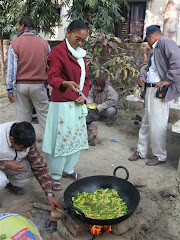We were woken by bright sunlight at 5:50 on Tuesday morning, dry air, deep blue sky and soaring temperatures. Students at Adarsha now assemble on the field (formerly a swamp) for daily prayers at 10am. David manages to get to Bokari without getting covered in mud; period 2 has mysteriously disappeared this week. The female teachers try to take him home at the end of the day to feed him up. He spent the end of the week and the weekend at training for the UNICEF School Self Assessment project. We will be involved in the SSA of ‘his’ DEO schools and the ones the ETC will use for school based training. I have been at headteacher training sessions most days, making suggestions about methodology that are sometimes implemented. At the end of the day I am usually asked if I have anything to add. Hard, when I have little idea about what has been going on most of the time. Lalmani and Bhakta are slowly moving books into the ‘library’; my main concern is giving teachers access to them; theirs in keeping them locked up. Using the brown dog as a guard does not seem to be an option.
The most dramatic news of the week was the withdrawal of the Maoists from the interim government on Tuesday. This led to an almost instant shut down of shops and transport, rallies at Mahendra Chowk, marches along Main Road, phone calls from VSO, e-mails from the British Embassy and Risk Management Office and warnings from our colleagues not to go out at night. Etienne had managed to get to Birtanagar from Dharan on Saturday to meet with Joseph and us to plan ‘the eastern cluster security strategy’. We met at our flat, followed by dosas at ‘Unique’ and a very hot walk to the river. This will be followed by a VSO conference in Kathmandu on October 5. Our UNICEF trips to schools have been cancelled. On Wednesday, life seemed to be back to normal, but the Maoists have announced their plan of ‘action’ (mostly inaction); the peace process and plans for the election are in jeopardy.
On Wednesday Govind cycled with me to Shankapur to meet Rekha Parajuli, one of the recently trained primary teachers I am following up. We stopped at every junction for me to draw a map so I can go independently each week. ‘Left at the Exotic Cheese Balls sign, follow the road past Lord Buddha College, right at the big tree, right onto the track with the red and yellow shop on the corner …….’ Mango trees with grazing cows and egrets searching for grubs and frogs surround the school. Rekha was delighted to see me, as were the students I had met before the monsoon holiday. It is hard to be an observer, as I am the centre of attention and am called on to do ‘turns’ eg sing and dance. I hope this will stop when they get used to me appearing regularly. There are 6 classes, 4 teachers, the head and a girl who bangs the plate and watches the nursery children. The head does not seem to do any teaching, but she occasionally walks around with a stick. The headteacher is not well and tells me her problems in rapid Nepali. She also makes good cinnamon tea. In period 4, Rekha seemed to be the only one actually teaching. She tells me that she is completely different after her training, loves the children (and they love her) and encourages them to come to school. On her way to work in the mornings, she collects them “aau, aau” a bit like a Nepali Pied Piper. Attendance is lamentable; 16 / 31 in grade 5, 9 / 23 in grade 4. Most of the children are out fishing, playing in the fields, watching the animals or working. She certainly has a child-friendly classroom if not a child-centred one. She speaks three words of English, mango, banana and apple, not particularly useful for observation feedback and ways of improving student learning. Bistari, bistari …… The English teacher is rarely there, and is unlikely to be much help. Next week I will make a start on constructive feedback. The only hazard I encountered on my way home was a herd of frisky young buffalo.
We had a visit from NCED (National Centre for Educational Development) on Friday to evaluate the current training programme. He brought an animated version of the new national anthem on his pen drive, so part of the afternoon was spent practicing how to sing it.
The main excitement for the young people of Biratnagar this week is Prasant Tamang, a young Nepali, getting to the final of ‘Indian Idol’. The students from the school came round collecting money on Friday for phone calls to India to cast their votes.
The main challenge at home this week is sorting out what to do with our rubbish. When Chhatra was home, it used to ‘disappear’ when we left it by the gate. It no longer disappears and is accumulating in a seething mass of maggots. We suspect it used to be chucked into the ditch. We take what we can (paper, plastic) to the Dalit family on the corner who make their living from scavenging rubbish, and leave vegetable peelings for next door’s goats. There is no public system; we are trying to hi-jack one of the men we see occasionally wheeling a rubbish cart through the streets, with no success so far.
We are getting better at the daily crossword in the Kathmandu Post; a curious mixture of Asian general knowledge questions, archaic English words and less-than-challenging anagrams eg ‘negative; on anagram’.
.jpg)
.jpg)







.jpg)
.jpg)
.jpg)
















.jpg)



















